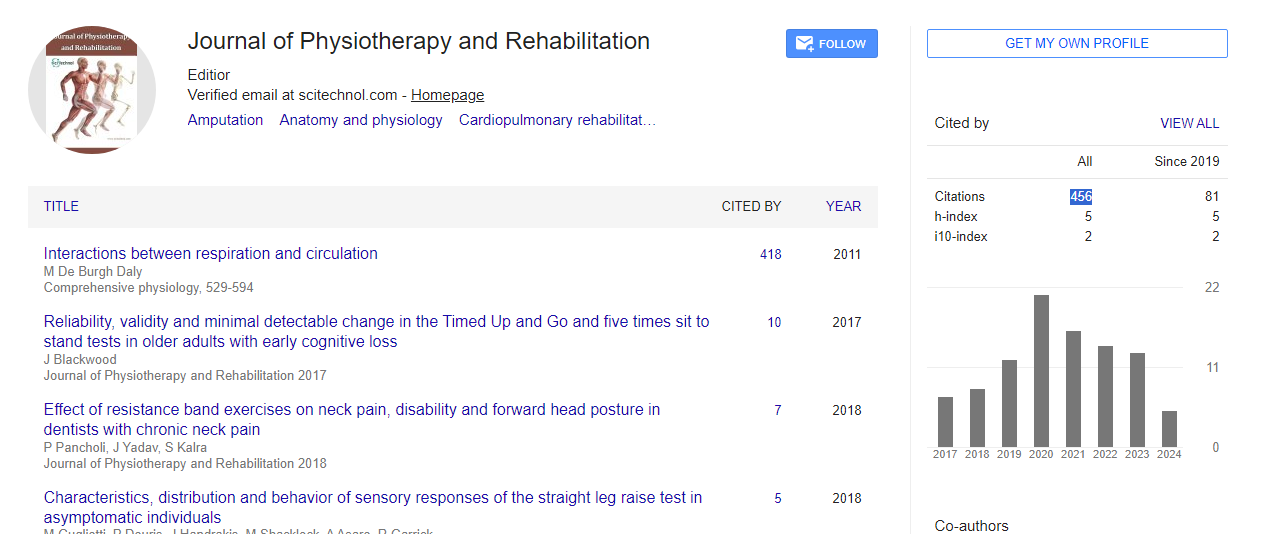Commentary, J Physiother Rehabi Vol: 7 Issue: 1
Transformative Impact of Psychiatric Rehabilitation
Morgan Reininghaus*
Department of Psychiatry and Psychotherapy, University Hospital Munich, LMU Munich, Munich, Germany
*Corresponding Author: Morgan Reininghaus
Department of Psychiatry and Psychotherapy
University Hospital Munich, LMU Munich
Munich, Germany
Email: morganreinin@med.uni-muenchen.de
Received date: 03 February, 2023, Manuscript No. JPTR-23-95992;
Editor assigned date: 07 February, 2023, PreQC No. JPTR-23-95992 (PQ);
Reviewed date: 21 February, 2023, QC No. JPTR-23-95992;
Revised date: 28 February, 2023, Manuscript No. JPTR-23-95992 (R);
Published date: 07 March, 2023, DOI: 10.4172/JPTR.1000119
Citation: Reininghaus M (2023) Transformative Impact of Psychiatric Rehabilitation. J Physiother Rehabi 7:1.
Description
Psychiatric rehabilitation is a holistic approach to helping individuals with mental health conditions achieve their fullest potential and live meaningful, fulfilling lives. It encompasses a range of interventions and supports that aim to empower individuals with mental illnesses to build skills, regain independence, and reintegrate into their communities. The transformative impact of psychiatric rehabilitation can be profound, offering hope, resilience, and recovery for individuals facing mental health challenges.
This rehabilitation focuses on empowering individuals to become active participants in their own recovery journey. It emphasizes a person-centered approach, recognizing that each individual is unique and has their own strengths, abilities, and aspirations. Through a collaborative and empowering partnership between the individual and their rehabilitation team, a customized plan is developed to address their specific needs and goals.
One of the key goals of psychiatric rehabilitation is to help individuals achieve independence and regain functional skills that may have been impacted by their mental health condition. This can include a wide range of areas, such as housing, employment, education, social relationships, and daily living skills. Rehabilitation interventions may include vocational training, education and job support, social skills training, housing assistance, and self-care training.
The transformative impact of psychiatric rehabilitation is not limited to functional skills alone. It also addresses the emotional, social, and psychological well-being of individuals with mental health conditions. Therapeutic interventions, such as counselling, psychoeducation, and cognitive-behavioural therapy, may be incorporated into the rehabilitation plan to address emotional distress, enhance coping skills, and improve overall mental well-being.
Psychiatric rehabilitation also aims to restore hope, resilience, and a sense of purpose in their lives. Many individuals facing mental health challenges may experience a loss of confidence, self-esteem, and hope for the future. Psychiatric rehabilitation helps individuals rediscover their strengths, talents, and abilities, and rebuild a sense of identity and purpose.
Through supportive and empowering interventions, individuals can develop resilience and coping skills to better manage stress, setbacks, and challenges. They can learn to identify and challenge negative beliefs or thought patterns, develop healthy coping strategies, and improve problem-solving skills. This can lead to increased selfconfidence, self-efficacy, and a sense of empowerment, which are essential elements for recovery.
The psychiatric rehabilitation also promotes social inclusion and community integration. It recognizes the importance of social relationships and meaningful participation in the community for mental health and well-being. Rehabilitation interventions may include community integration activities, peer support groups, and opportunities for social engagement and participation. This helps individuals build a supportive network of peers and establish meaningful connections in their communities, reducing social isolation and fostering a sense of belonging.
In this psychiatric rehabilitation there are transformative benefits, facing several challenges and barriers that can limit its reach and impact. One such key challenge is the stigma associated with mental illness. Many individuals facing mental health conditions may encounter discrimination, prejudice, and misconceptions, which can impact their access to rehabilitation services and community integration opportunities. Overcoming stigma requires a multi-faceted approach that involves advocacy, education, and promoting inclusive attitudes and practices in society.
In many regions, there may be limited resources and funding for mental health services, including rehabilitation programs. This can result in long wait times, inadequate staffing, and limited availability of services, which can impact the quality and effectiveness of rehabilitation interventions. Addressing these challenges requires advocating for increased funding and resources for mental health services, and promoting policies that support the availability and accessibility of psychiatric rehabilitation programs.
Psychiatric rehabilitation is also a transformative approach in supporting individuals with mental health conditions on their recovery journey. It empowers individuals to regain independence, build skills, and reintegrate into their communities, while also addressing emotional, social, and psychological well-being. Through personcentered and holistic interventions, psychiatric rehabilitation helps individuals restore hope, resilience, and a sense of purpose in their lives.
 Spanish
Spanish  Chinese
Chinese  Russian
Russian  German
German  French
French  Japanese
Japanese  Portuguese
Portuguese  Hindi
Hindi 